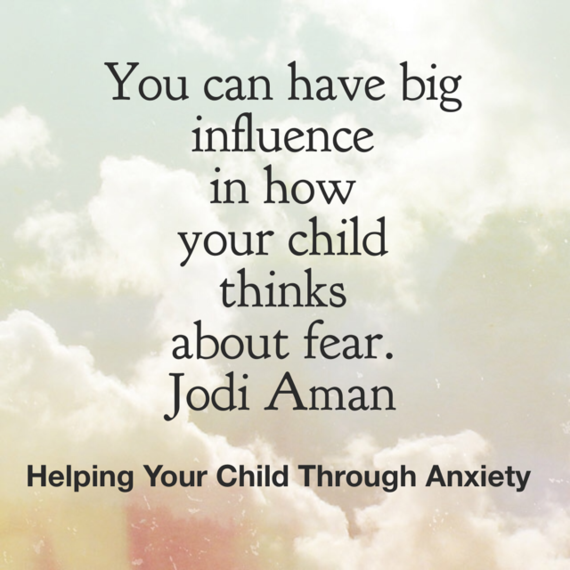
I have never felt so helpless as I do when my children are anxious. I see that they are physically safe, but know that in their little struggling minds, they don't feel so safe. In fact, they feel the opposite of safe and this is painful and overwhelming.
As parents, it is our job to keep our children safe. But how can we save them from their own minds?
We can hold them and listen and try to talk them out of it. However, sometimes they believe what the anxiety is telling them so much, that they argue against our words. Even words we know can take their suffering away.
"You don't have to worry about that. That won't happen. What the anxiety is saying is not true. I would never leave you in the middle of the night and move to Australia leaving you all alone."
My heart breaks and I want to panic from helplessness myself.
Panicking, of course, is the worst thing that we can do. If we panic, they panic more.
It is like telling them their fear -- is something to fear. You panic, and his or her fear is validated. Made more real.
Fear objectively is not the problem. When children experience anxiety, it is the fear of the fear that is the problem. It is how kids think about fear that matters most to their mental state.
If your child thinks feeling anxious is the worst feeling in the world, it will feel like the worst feeling in the world. If they think they are helpless, they will be.
The good news is that you can have a big influence in HOW your child thinks about fear.
Help your kids with anxiety by using the tools below:
1. Model confidence and calmness.
Children take their cue from you. My daughter often worries about being picked up from school -- as if I would forget her. Each time, I explain why I trust myself to pick her up and tell her what the school would do to keep her safe if I didn't. Once, she said to me, "You are never worried about anything."
I told her to look at my face when she is worried. "Only if I am worried, do you need to be." Her fears are huge to her, but they wane when she can't convince me to be afraid.
2. Have confidence in them.
Be confident that your children are OK, even if they have anxiety. Anxiety is just an experience, and every event with anxiety is merely an opportunity to get rid of it. Remind your kids of the skills and knowledges you see in them that can have helped them shrink their anxiety. This will help them to step into those skills more readily. Confidence, like worry, is contagious. You'll want this to pass on.
3. Talk out their fears.
Children's anxieties loom much larger when they don't say them out loud. Kids worry that if they talk about them, they might get worse. Usually, they get better. Inside the mind, worries are ten times as scary. Sometimes kids are angry or disinterested and don't realize that it is an anxiety causing the problem. If they could name it, it helps immeasurably, so ask questions.
Then you can reassure them, or laugh at how silly the worry is.
4. Personify the anxiety.
Kids often feel that anxiety is part of their identity. This makes them feel more out of control. Giving the worries a separate identity keeps the child's identity intact. It helps kids feel empowered because now they are not fighting themselves. "Out there," the anxiety looks different and is less scary. Sometimes this is all you need to do.
5. Convince him or her that he or she need not be afraid.
For example, if they are afraid of you getting sick, list for them the things you do to keep yourself healthy.
This will work best when you are convinced. Do your own work first. Your child's fear often reflects your fears. (Our children often live out our issues.) Work on convincing yourself you need not be afraid. This will help them more than anything.
6. Take action.
Action conquers fear. Helplessness makes us feel out of control. Giving them something to do can help them counter fear. For example, in response to tragedy, making food or another donation can replace helplessness with helpfulness, giving children confidence.
7. Make them do hard things.
Our protection instinct has us wanting to save them from struggle. But this often lets fear win. When your child does not choose to do something because of fear, it is sometimes important to push them to do it. This is your job as their parent to teach them they can be confident in themselves by doing things they don't want to do (or are too scared to do).
Love helps all fear.
Whatever you do, it is most important to trust yourself, trust your child, and stay connected. Our kids are going through their own spiritual journeys, and they are going to have struggles because this is what helps them grow. As parents, we cannot save them from every problem. They have to experience problems to learn skills for dealing with worse ones that may come later.
Love them through their struggles and trust that they will be okay. Struggles are just experiences of the mind. All of it is recoverable.
Things happen to us, but we get through. Teach your children skills and let them have their experiences. You can still be there to love and gently (and sometimes not so gently) guide them.
